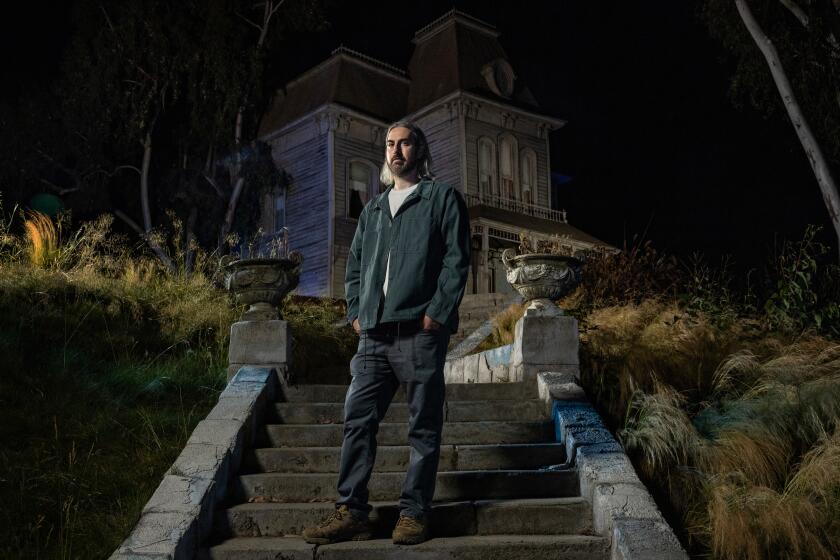David Lynch aims to ‘conjure another kind of beauty’ with his latest surreal project
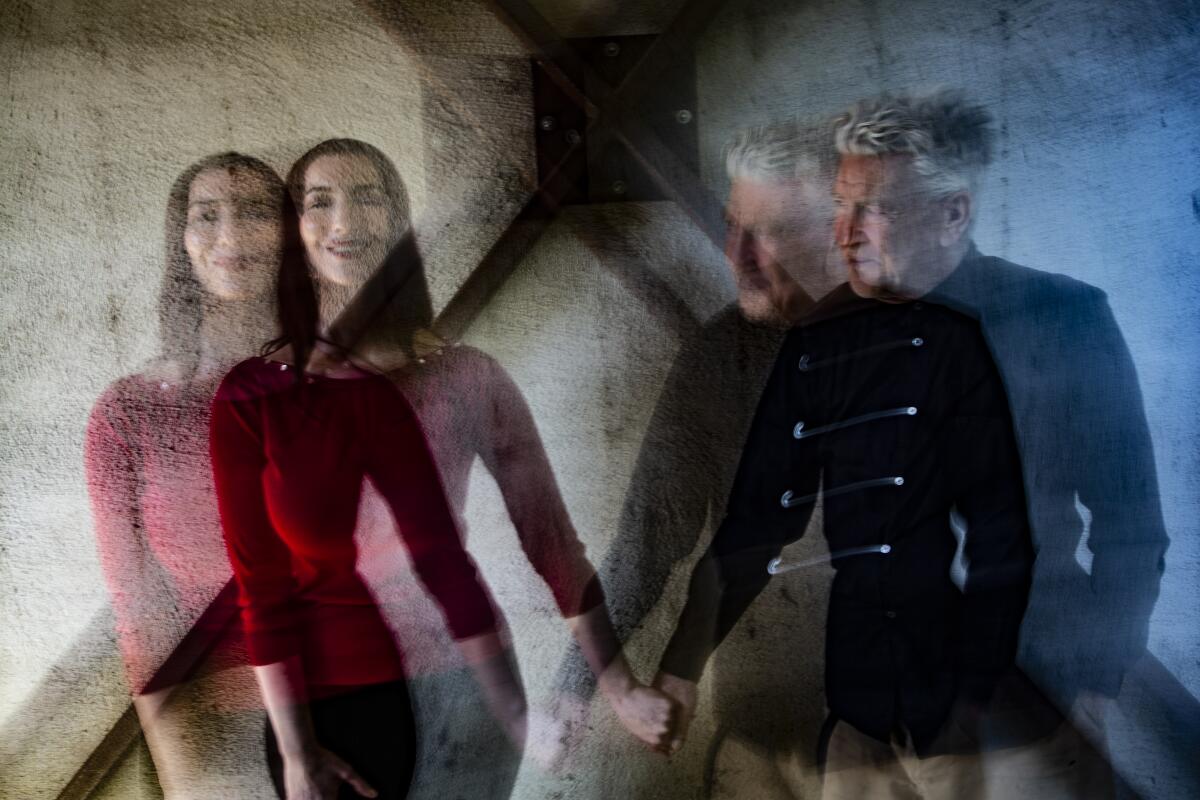
- Share via
The video landed around the world with a surreal flutter of light and sound, just as David Lynch promised. The acclaimed filmmaker and artist had appeared online from the shadows of his Los Angeles home days earlier, leaning toward the camera in Wayfarer shades, to declare mysteriously: “Ladies and gentlemen, something is coming along for you to see and hear.”
What then arrived was a music video directed and shot by Lynch, presenting the face and layered vocals of his frequent musical collaborator, Chrystabell, singing a haunted, romantic tune called “Sublime Eternal Love.” The voices were not in harmony but overlapping in a strange and mesmerizing pattern — a sound that could be described as passionately ambient.
The song and video, released on June 5, were the first glimpses of a new album, “Cellophane Memories,” set for release Aug. 2 from Sacred Bones Records. The smoky second single, “The Answers to the Questions,” arrived Tuesday with muffled beats and deep guitar twang, as Chrystabell sang Lynch’s lyrics of drama and romance:
“When he was here / She thought they had a bond / An unshakable bond / But was it too good to be true? / She fell into a dark dream of despair.”
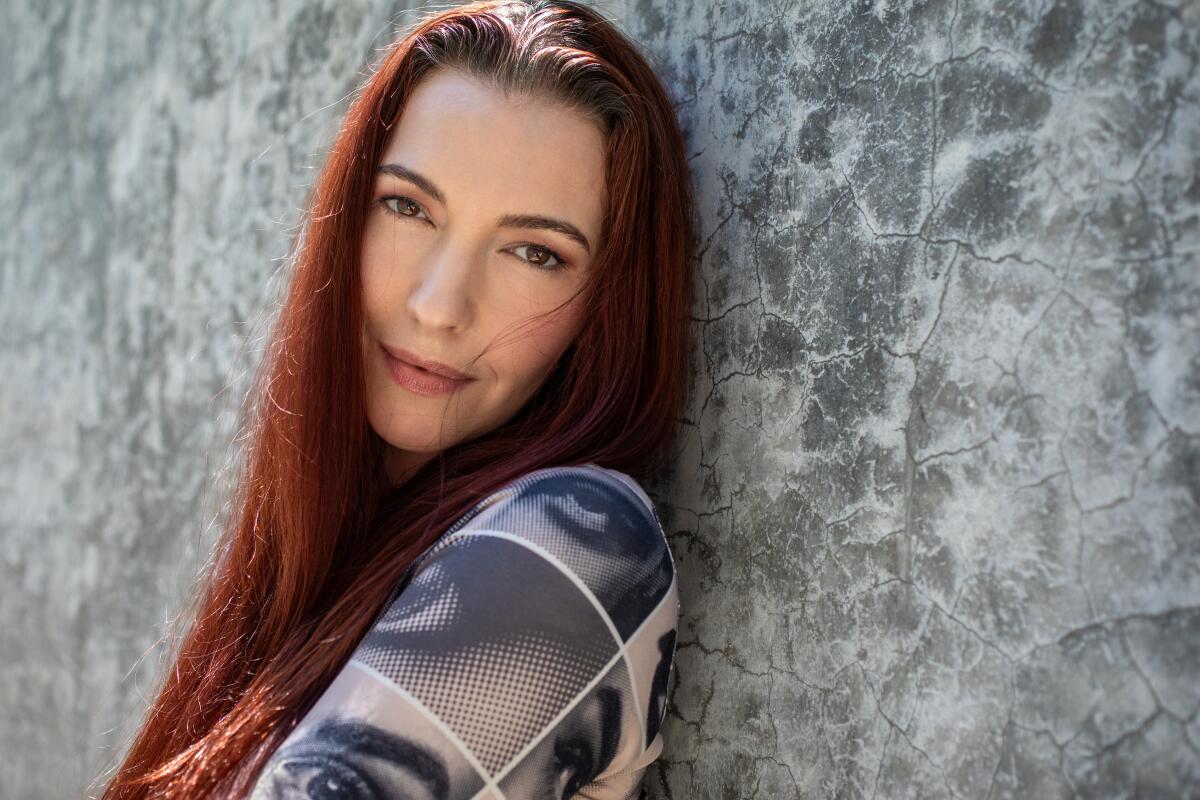
The music has a dreaminess that would be recognizable to any Lynch follower, but the eccentric arrangement of vocals is a twist to that sound, created through what he calls “experimental editing.”
“I think with anything new, it takes a little while to get used to it — and then the beauty comes out — or the rightness of it comes out,” says Lynch, between sips of Americano. “When you go into accidents and experimentation, it gets different. They conjure another kind of beauty, and it’s magical. And Chrystabell is perfect for this.”
The filmmaker is on the shaded patio of his home in the Hollywood Hills, where Lynch has lived since 1987. Now 78, he’s in good spirits for this rare in-person interview since the rise of COVID-19, his thick gray hair standing at attention, cropped close on the sides.
He was last on the big screen as an actor in Steven Spielberg’s 2022 autobiographical film, “The Fabelmans,” playing the cantankerous, cigar-chewing movie director John Ford. “I smoked 16 cigars that day,” Lynch recalls with a smile of performing the part, which he initially turned down.
He’s been an obsessive listener to music throughout his life, from Elvis Presley (his first musical idol) to Rebekah Del Rio and the German metal band Rammstein. He’s recorded songs with Roy Orbison, Trent Reznor and Julee Cruise, and he began a solo recording career with 2011’s “Crazy Clown Time.”
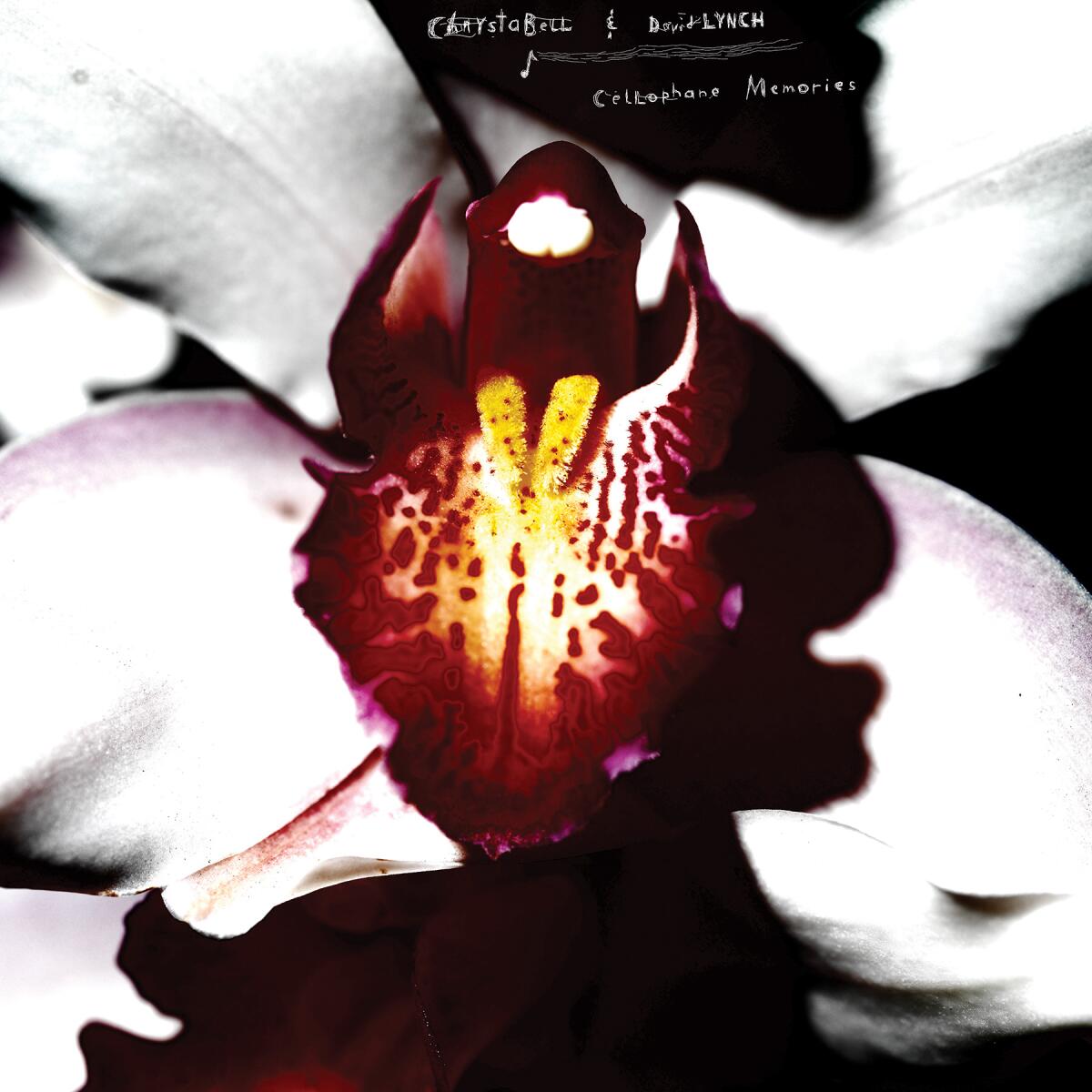
The title of his new album with Chrystabell refers to that layering of voices. “This music has a transparency,” Lynch explains. “The different voices are each transparent to hear the other voice, to hear the other thing. … So it’s like cellophane and it conjures memories.”
The first song created in this mode by Lynch and Chrystabell was “The Sky Falls,” and it set a course for what followed, even if it wasn’t clear what that was in the beginning.
“The first time we heard it, it sounded terrible,” Lynch says.
His partner agrees.
“The first couple of times you’re like, ‘I don’t know about this. I don’t know about this at all,’” Chrystabell says in a separate interview at the house. “‘Do you want to listen again?’ ‘Yeah, David.’ It’s just twisting your brain a little bit, and then you’re like, ‘Actually, I think this is kind of fantastic.’
“We had other material that was going in, let’s say, more traditional directions. But this was the thing that was lighting us up.”
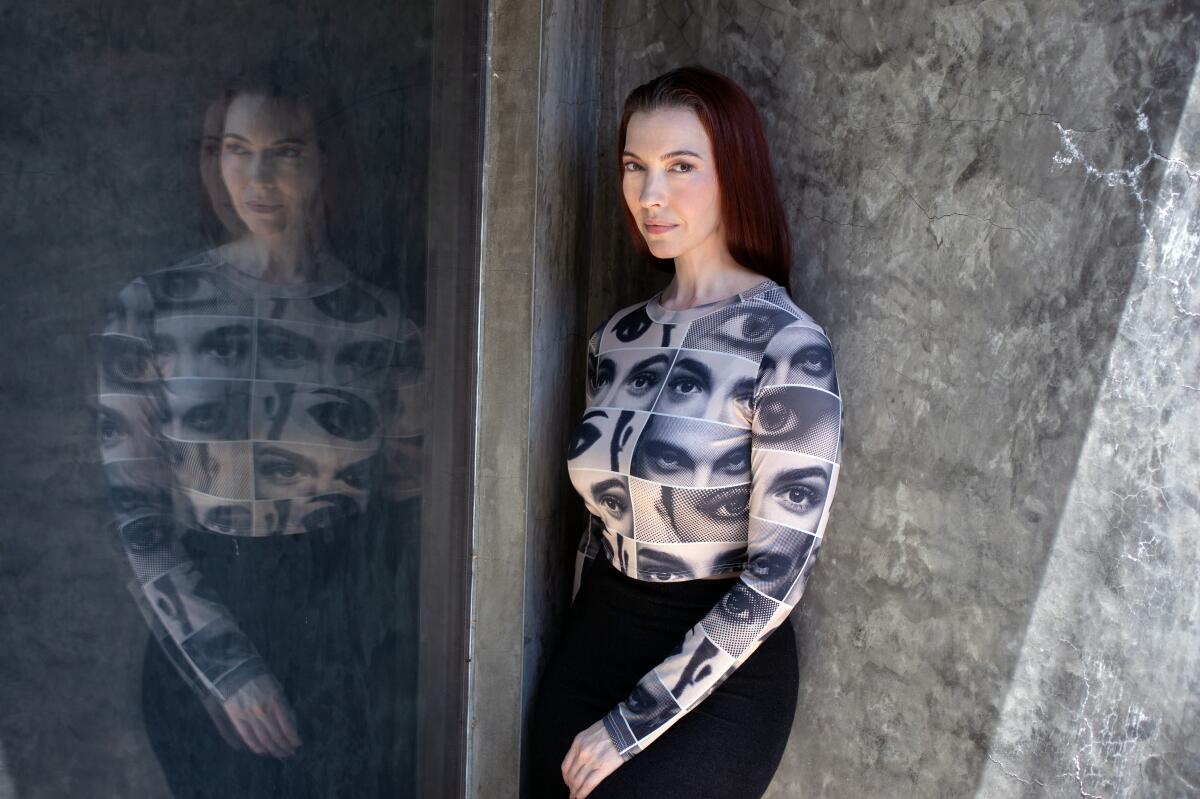
During the recording sessions, the Texas-based singer would travel to L.A. and stay at Lynch’s home, where he has a full recording facility, Asymmetrical Studio. Like other parts of the house, her bedroom had walls that look like distressed concrete, with a giant picture of an atom bomb explosion hanging nearby. “Under that umbrella of experimentation, it was playful and it was fun,” she says. “And there were no strings attached: Hey, let’s just see what happens.”
She describes her time there as “more like an artist in residence,” with few time constraints. Sessions unfolded over a year’s time, as the singer returned home to Texas, then came back to L.A. periodically to continue work. “So everything was getting its chance to germinate in the digital juices and in the ether,” she adds.
The songs were recorded by Lynch and Chrystabell alone, with no help from outside musicians or even an engineer. While Lynch produced the recordings, Chrystabell acted as engineer behind the controls. In that, she was drawing on the experience of making five previous solo albums of otherworldly torch songs and avant-garde pop, and a childhood growing up in a busy San Antonio recording studio owned by her stepfather.
Emerald Studios was the biggest recording studio in South Texas then, a place to record the occasional Coca-Cola jingle and where Tommy Lee Jones might show up for a looping session for TV’s “Lonesome Dove.”
“She was familiar with all this stuff, and she is pretty familiar with Pro Tools,” says Lynch, referencing the standard professional recording program.
Lynch wrote the lyrics in the moment as needed and in a stream of consciousness scrawled onto blue notecards. All the vocal melodies were hers.
“We’d need something for her to sing, so I’d just write them out,” says Lynch. “It almost flowed right out without much thinking, but Chrystabell took them and made them real in the singing.”
They recorded 10 songs for the final album, from the reverb and romance of “Two Lovers Kiss” to the uneasy “Reflections in a Blade.”
They first met in 1999, after Lynch’s friend and music agent at CAA, Brian Loucks, brought the tall, statuesque singer over as a potential voice in his films. In his home studio, Lynch immediately got to work with Chrystabell, setting her voice to a backing track created by the filmmaker and John Neff. The result was a dreamy, torrid song called “Right Down to You.”
“She was complete: She was so beautiful, but she looked to me like a praying mantis,” Lynch recalls of that first meeting. “In a weird way, what appealed to me as much or more than her voice was her ability to tune in to something new and instantly understand what I was talking about — and be able to do it. She’s really smart and tuned in. We were just meant to work together.”
Ahead of a show with the L.A. Phil at the Hollywood Bowl, Beck takes a look back at his decades-long career.
The first public signal of their creative allegiance was “Polish Poem,” a celestial song of lost love included in Lynch’s 2007 film “Inland Empire.” But the process of completing a first album together stretched to a full decade, as Lynch worked on other projects. Chrystabell’s debut solo album, “This Train,” finally landed in 2011 and established the singer as a new voice within Lynch’s mysterious world.
They continued to occasionally make music together, including a 2016 EP, “Somewhere in the Nowhere.” The following year Lynch cast her as FBI agent Tammy Preston in the unexpected third season of “Twin Peaks.” Most of her scenes included Lynch himself as deputy director Gordon Cole.
“We have a harmonic, compatible vibration,” says Chrystabell, born Chrysta Bell Zucht. “There’s something unseen that keeps drawing us together. It’s one of those mysteries in life. And every time we do something, I feel so great about that. My cup is full. I’m complete.”
“Sublime Eternal Love” is the first time Lynch has directed a video to accompany their music together, and the ghostly animated video for “The Answers to the Questions” is the second. He says he may direct at least one more for the album.
“There’s something about putting music to an image that can really cause people to fall in love with that music if it’s done in a certain way,” he says, but he also notes that the wrong moving image “can absolutely kill the music. So it’s a dangerous, tricky thing.”
At the same time, Lynch says he’s disappointed at how quickly music and video are so quickly consumed and discarded in the modern churning of content. “Things come and go so fast, it hardly matters, you know? It’s kind of unsettling these days, this business.”
Even so, he’s been inspired enough to also create other visuals for the release, including the first in a series of comical shorts made from stock footage, “We’ll Deliver ‘Em.” In that clip, train engineers driving a locomotive in vintage film are voiced by Lynch, as they contemplate the urgent delivery of the album: “I think this one is going all the way to the top. Sounds good!”
L.A. jazz reeled when Highland Park’s ETA closed. There’s still great music, but clubs are nervous.
Music has long been a key ingredient in Lynch films, from his use of Samuel Barber’s deeply emotional “Adagio for Strings” in 1980’s “The Elephant Man” to the many years of smoky romantic music created for him by his late friend Angelo Badalamenti. Lynch played trumpet as an adolescent, but it wasn’t until he connected with Badalamenti during the making of 1986’s “Blue Velvet” that he saw a place for himself as a music creator.
“I realized that musicians are just human beings,” Lynch says. “Most every musician I’ve met, they’re happy. They’re laughing. It’s like a camaraderie. It’s a joyful, blissful, fantastic thing. And they like to sleep late, and they like to party, you know? And they like to enjoy life and make music. They’re a great bunch. It’s just a world filled with talent.”
On the new album, two songs include tracks that were originally created by Badalamenti in collaboration with Lynch years earlier. The filmmaker kept the music on file for later use. (Two others were tracks started with Lynch’s former longtime studio engineer, sound designer and sideman, Big Dean Hurley.) “I call it firewood,” he says of the recordings. “I’ve got bins and bins of stuff.”
Badalamenti, who died in 2022 at 85, was among Lynch’s closest friends. The composer even acted occasionally in Lynch’s films, including a jarring scene in “Mulholland Drive” where he plays a mob boss who violently rejects a cup of espresso.
“I would call Angelo pretty frequently. He was like my brother,” Lynch says. “So many people have passed away in my world, but Angelo passing away, it struck me really the hardest. And it just doesn’t seem possible that he’s gone. It just seems like I could call him up and we could make music again. The music he made was so spectacular.”
The composer’s role on two tracks on the new album continues that legacy. “Angelo used to always say, ‘David, it’s all down to 12 notes,’” Lynch recalls. “But this music is maybe more than 12. When you go into accidents and experimentation, it gets different. They conjure another kind of beauty.”
After “X” and “Pearl” transformed the director’s muse, Mia Goth, into a star, the horror filmmaker re-created 1980s Los Angeles to complete his trilogy for A24.
For Chrystabell as a live performer, the challenge will be to bring these songs to life onstage, if she can. She plans to perform three of the songs at an artist retreat in Marfa, Texas, in August as a kind of trial run, but is still working out how.
“I light those little fires under myself so that I have to figure something out,” she says with a laugh. “There’s a part of my personality that loves the challenge of it. And I think it could yield a very interesting live performance … maybe something that leans into performance art.”
The release of “Cellophane Memories” may just be the beginning of a new round of collaborations with Lynch. Aside from the new album, there are several other recordings in different stages of completion.
“It’s really about if he has the idea, if he has the inclination,” Chrystabell says. “If that inner motivation isn’t within him, it is not happening. But if it is happening, it’s so great because he really enjoys doing these things. He loves it.”
More to Read
The biggest entertainment stories
Get our big stories about Hollywood, film, television, music, arts, culture and more right in your inbox as soon as they publish.
You may occasionally receive promotional content from the Los Angeles Times.


